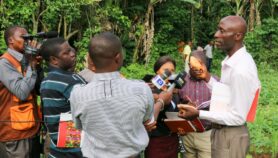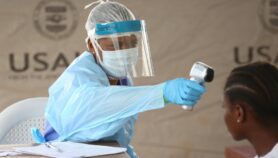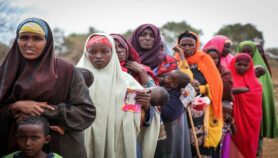By: David Dickson
Send to a friend
The details you provide on this page will not be used to send unsolicited email, and will not be sold to a 3rd party. See privacy policy.
This week, SciDev.Net launches a regional network covering the countries of Sub-Saharan Africa, the first in a planned series of such initiatives.
From the earliest days of SciDev.Net, we have been aware of — and highly sensitive to — the fact that an organisation intended to promote science and technology in developing countries has been set up in the 'developed' North. One way we have tried to ensure that our activities genuinely reflect needs as seen from developing nations themselves is by requiring that a majority of our trustees come from these countries. Another is by actively seeking contributors — whether journalists, researchers or others — from these parts of the world.
But we are also aware of the need to go further. We must ensure not only that our website reflects the needs, issues and priorities as they are seen on the ground, but also that in its own operation, SciDev.Net reflects the principles that it promotes. To this end, we have been working towards the creation of regional networks of individual and organisations based in developing countries that share our objectives, and that are willing to collaborate under the SciDev.Net umbrella to put these objectives into practice.
This week, therefore, we are extremely pleased to announce the birth of the first of what we hope will be a series of such regional networks. SciDev.Net Africa, a regional network covering the countries of sub-Saharan Africa, is being formally launched on Monday 30 September at a meeting in Entebbe, Uganda. The event will take place on the first day of a four-day SciDev.Net workshop on a topic that is central to our raison d'être, namely the role of science communication in promoting sustainable development.
Main tasks of the network
SciDev.Net Africa — like, we hope, its future siblings — will have three main tasks. The first will be to expand and improve our regional coverage of science and technology-related issues by strengthening our contacts with individuals close to the events featured on the website. In addition to increasing our supply of regional news and feature articles, this task will include building up a base for contributions to dossiers and other specialised areas of the website. This will ultimately serve to strengthen the website's regional gateways — an important expression of our regional activities.
The second task will be to increase the use of the SciDev.Net website and the dissemination of material that appears on it within the region covered. This will be done, for example, by establishing active contact with organisations and institutions which, we feel, could benefit from access to this material.
Thirdly, regional networks will have a key role to play in achieving capacity building in science and technology communication — one of our key missions. There are various ways to achieve this, ranging from boosting the strength and profile of science journalism in individual countries, to organising workshops intended to enhance the professional skills of all those engaged in science and technology communication — as we are doing in Entebbe this week.
Long-term strategy
None of this will occur overnight. It will take time to identify, agree on and implement a sound, long-term strategy. It is too soon, therefore, to specify what the precise activities of SciDev.Net Africa will be, or indeed exactly how it will operate. Much will depend on the views of those interested in engaging in such an initiative over the weeks and months ahead.
We have already consulted widely in the region on whether the need exists for such an organisation, and have received a response that, in general, has been both positive and enthusiastic. These discussions have produced a number of concrete proposals for future action. But, apart from the decision to recruit a regional co-ordinator based in East Africa and to establish a regional advisory committee, no firm commitments (in addition to the broad outlines described above) have yet been made.
Some might argue that, in the absence of such commitments, announcing the launch of SciDev.Net Africa is premature. We would disagree. What is being launched this week is a broad framework for future action. Putting flesh on the bones is the next step, in which we hope that the regional co-ordinator, the regional advisory committee, our own staff and trustees, and those who hope to benefit from the initiative will each be closely involved.
Some of the future steps, in particular, will depend on the outcomes of the Entebbe workshop that is taking place this week. Too often, workshops of this kind are run in isolation from the professional worlds in which most of their participants operate, and as a result lack any form of follow-up. We are trying to avoid this by ensuring that any recommendations on or conclusions for, future action can be put forward in a way — namely as proposals for activities by SciDev.Net Africa and those engaged in the network — that they can be acted upon in the relatively near future.
Linguistic, cultural and geographical challenges
We are intensely aware of the challenges ahead. Africa, for example, is a vast continent made up of many different cultures facing many different types of problem. Even limiting our focus to sub-Saharan Africa is ambitious. Although science communicators from 11 African countries will be attending the workshop in Entebbe the majority are coming from East and Southern Africa. Furthermore, the working language of the workshop will be English, another limiting factor; yet the comparable needs of French- or Portuguese-speaking nations cannot be ignored, and additional efforts need to be focused on these.
Another major challenge is the lack of the technological infrastructure that those living in developed countries now take for granted. It may well be true, for example, that faster Internet links are gradually being introduced across the African continent. And the potential contribution of information and communication technologies (ICTs) to achieving sustainable development is certainly promising. But slow, expensive and unreliable telephone connections are still the norm for most of those engaged in science communication. And while this remains the case, much of this potential is unlikely to be met.
Despite these challenges, however, we are convinced that SciDev.Net Africa can make an important contribution to increasing awareness of the potential role of science and technology in meeting the continent's social, economic and environmental needs in a socially and politically acceptable way. We also remain certain that there are a sufficient number of individuals and organisations that share our goals and principles to ensure that through effective, collaborative action, the chance of achieving at least some of this potential can be significantly increased.
To receive our weekly e-mail alert, please register at www.scidev.net/register.
If you are interested in getting actively involved in SciDev.Net Africa, please contact [email protected]
© SciDev.Net 2002













